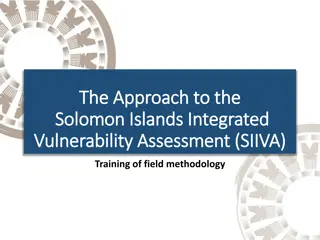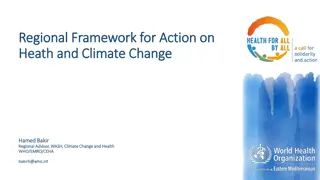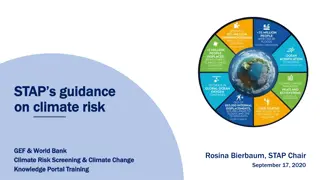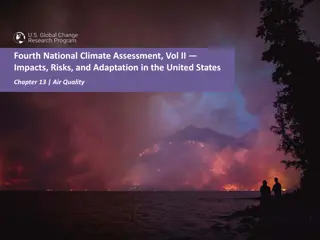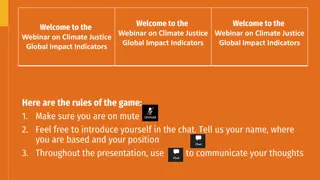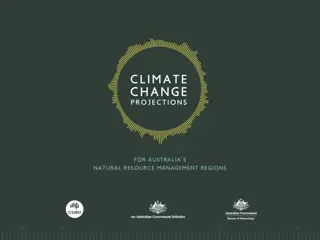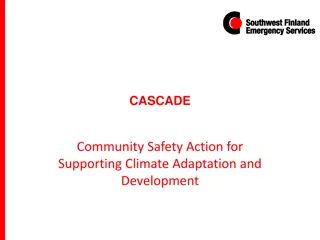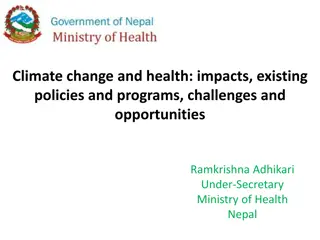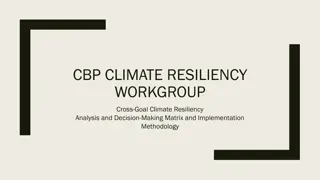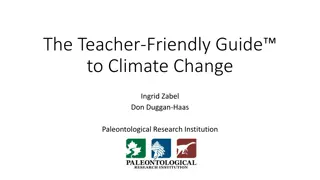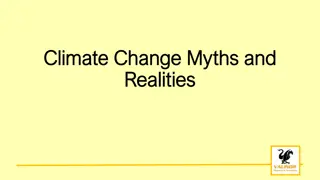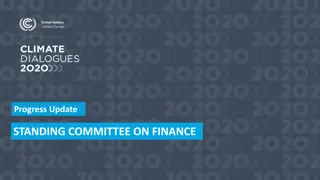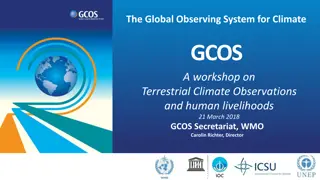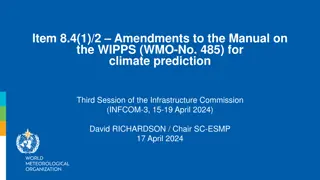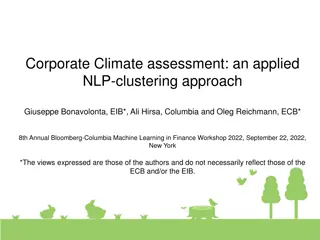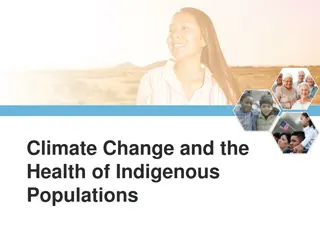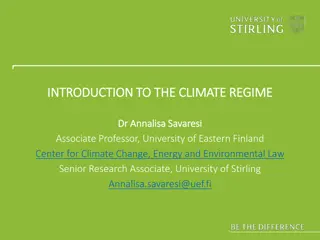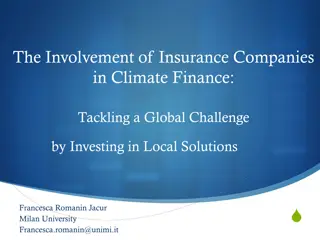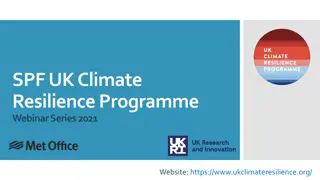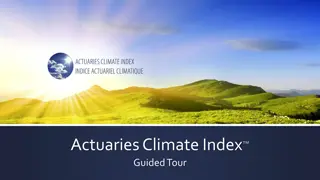Improving Health Amid Climate Change Challenges
Climate change has significant impact on health, requiring global sectors to act. Explore initiatives of the Ministry of Health in addressing climate-related health threats. Understand the interplay between climate change and health systems for a sustainable future. Learn the adverse effects of clim
4 views • 10 slides
Understanding Climate Change: Weather vs. Climate, Kppen-Geiger Classification, and Major Climate Zones
Explore the distinctions between weather and climate, delve into the Kppen-Geiger Climate Classification System, and discover major climate categories such as tropical climates. Gain insights into climate change and its impact on our environment.
8 views • 11 slides
EU Global Leadership in Climate Policy - Assessment and Analysis
The European Union (EU) has been at the forefront of international climate change leadership for decades, navigating challenges and actively engaging in various climate agreements. This comprehensive assessment delves into the framework, analysis, and appraisal of EU climate leadership, highlighting
3 views • 24 slides
A Student Exploration of the Global Impacts of Climate Change on Human Health
This research delves into the effects of climate change on human health, covering how a warming climate, changes in precipitation, and increased flooding frequencies impact various health aspects such as infectious diseases, nutrition, and mental health. The study provides a visual model illustratin
5 views • 17 slides
National Climate Change Bill Overview
The National Climate Change Bill aims to establish an effective response to climate change in South Africa, promoting a transition to a low-carbon, climate-resilient economy. It focuses on coordinated actions, adaptive capacity enhancement, greenhouse gas management, and a fair global contribution.
8 views • 21 slides
Regional Climate Modeling in CORDEX South Asia for Climate Change Research
This information details the regional climate modeling efforts within the CORDEX South Asia framework, focusing on high-resolution dynamical downscaling of CMIP5 climate projections. It highlights the activities, opportunities, and challenges for assessing regional climate change, along with future
4 views • 11 slides
Investment Responses to Biophysical Climate Impacts on Water, Energy, and Land in SDGs and Climate Policies
Investment assessments using Integrated Assessment Models (IAMs) are evolving to include biophysical climate impacts, assessing climate uncertainty on investments. The approach involves the MESSAGEix-GLOBIOM IAM, considering climate policy, SDG measures, and impacts under different scenarios. Climat
6 views • 32 slides
Gender-based Climate Change Litigation: A Key Solution?
Gender-based climate change litigation is emerging as a potential solution to address the disproportionate impact of climate change on different genders. Various international bodies have recognized the importance of integrating a gender-responsive approach in climate action to uphold human rights,
4 views • 12 slides
Overview of DSW End Point Assessment Team Leader Level 3
DSW End Point Assessment Team Leader Level 3 provides a clear understanding of the assessment process, ensuring individuals comprehend why and when it occurs, responsibilities involved, and how DSW supports them. It covers topics such as what End Point Assessment entails, assessment design and deliv
1 views • 18 slides
Integrated Vulnerability Assessment and Human Security for Sustainable Livelihoods in the Solomon Islands
The approach to the Solomon Islands Integrated Vulnerability Assessment (SIIVA) and the Integrated Vulnerability and Adaptation Assessment (IVA) are key methodologies to assess climate change risks and prepare nations for adaptation. The objectives include informing national climate change policies,
0 views • 21 slides
Regional Framework for Action on Health and Climate Change
Regional Framework for Action on Health and Climate Change outlines pillars focusing on health protection from climate change through governance, policy, and engagement. It emphasizes building health systems resilience, multi-sectoral actions, and mobilizing support for public health responses. Pill
3 views • 6 slides
Climate Risk Assessment and Guidance for GEF Projects
This content discusses the guidance provided by STAP on climate risk assessment for GEF projects, emphasizing the importance of evaluating sensitivity to climate change, addressing risks over the period 2020-2050, and considering mitigation measures. It highlights observations from the June 2020 wor
0 views • 10 slides
Impacts of Climate Change on Air Quality and Health in the United States
The Fourth National Climate Assessment, Vol. II, highlights the increasing risks from air pollution in the United States, impacting over 100 million people in communities where air quality exceeds health-based standards. Climate change worsens air pollution levels, leading to adverse health effects,
0 views • 10 slides
Gender and Climate Change in Agriculture: Impacts and Adaptation Strategies
This workshop explores the intersection of gender and climate change in agriculture, emphasizing the importance of considering gender dynamics in adaptation planning. It covers the effects of climate change on men and women in agriculture, reasons for gender-sensitive adaptation planning, global and
0 views • 10 slides
Regional Project Proposal to Enhance Climate Resilience in Pakistan, Mongolia, and PRC
This proposal outlines a regional project focusing on enhancing climate resilience and agricultural productivity in Pakistan, Mongolia, and the People's Republic of China (PRC). The project aims to increase access to credit for smallholder farmers, promote climate-smart agriculture technologies, and
0 views • 12 slides
Understanding Essential Climate Variables (ECV) and Their Requirements
Essential Climate Variables (ECVs) are physical, chemical, or biological variables crucial for characterizing Earth's climate. They provide empirical evidence for climate understanding, prediction, risk assessment, and more. ECVs must be relevant, feasible, and cost-effective, not as stand-alone var
0 views • 14 slides
Personal Rights in European Climate Litigation
Climate litigation in Europe focuses on individual rights and the shortcomings of traditional governance mechanisms in addressing climate change. The emergence of climate litigation as a crucial tool in governance is driven by the need to protect individuals and specific groups who are disproportion
0 views • 17 slides
Analyzing Systemic Climate Risk in the Financial Sector
This study discusses systemic climate risk in the financial sector by examining the effects of climate risks on financial institutions. It aims to design a market-based framework to assess the vulnerability of financial institutions to climate risks and analyze potential contagion effects. The frame
0 views • 39 slides
Climate Justice Global Impact Indicators Webinar - June 2023
Explore the Climate Justice Theory of Change, key definitions, impact indicators, and the importance of climate-relevant decision-making in this informative webinar. Gain insights on climate adaptation, resilience, and the effects of climate change, all aimed at empowering marginalized communities t
0 views • 27 slides
Understanding Climate Projections for Impact Assessment
The Climate Futures Framework provides insights into using climate projections for impact assessments, emphasizing the importance of tailoring projections to specific objectives. Typical climate projections involve central tendencies and uncertainty ranges, but assessing multiple variables jointly r
0 views • 24 slides
CASCADE Project: Climate Adaptation & Development Support
CASCADE is a two-year project funded by DG ECHO aimed at developing a macro-regional approach for climate change risks in the Baltic Sea Region. The project focuses on risk assessment, treatment, and capacity building to enhance urban risk management related to climate change. It involves civil prot
0 views • 8 slides
Institutional Assessment and Effectiveness Workshop Achievements at SUNY Oneonta
The Office of Institutional Assessment and Effectiveness at SUNY Oneonta has made significant progress in developing assessment protocols and processes, leading to a culture of assessment. This includes completing planning and assessment cycles, establishing objectives and procedures, and aligning u
1 views • 16 slides
Kentucky Child Health and Climate Advocates Meeting Summary
Kentucky Child Health and Climate Advocates held a meeting to discuss the role of pediatricians in addressing climate change. The event focused on promoting education and readiness in communities regarding climate-related health issues. Recommendations included building coalitions and integrating cl
0 views • 11 slides
Climate Change and Health Impacts in Nepal: Challenges and Opportunities
This document explores the impacts of climate change on health in Nepal, highlighting existing policies, programs, challenges, and opportunities. Nepal is among the most vulnerable countries due to its heavy reliance on climate-sensitive sectors, fragile ecosystems, and technical capacity constraint
0 views • 21 slides
National Priorities for Climate Change Science and Knowledge in Canada
Canadians are experiencing firsthand the impacts of climate change, including wildfires, heatwaves, floods, hurricanes, and droughts. To address these challenges, foundational climate change science and knowledge are essential for understanding our changing environment, identifying impacts, making i
0 views • 9 slides
Chesapeake Bay Climate Resiliency Workgroup Analysis & Implementation
This document outlines the goals and objectives of the Chesapeake Bay Climate Resiliency Workgroup, focusing on increasing the resiliency of the watershed to changing environmental and climate conditions. It includes strategies for monitoring, assessment, adaptation, and project goals to enhance the
0 views • 9 slides
Understanding Climate and Its Impact on Earth
Exploring the fundamentals of climate, this comprehensive guide covers topics such as climate zones, climate formation, atmospheric composition, the role of CO2, ocean heat absorption, and circulation patterns. From the basics of weather and seasons to the significant impact of climate change, learn
0 views • 12 slides
The Teacher-Friendly Guide to Climate Change
The Teacher-Friendly Guide to Climate Change authored by Ingrid Zabel, Don Duggan-Haas, Robert Ross, and others explores topics such as climate measurement, natural causes of climate change, historical climate perspectives, and more. It delves into the significance of understanding past climates to
1 views • 12 slides
Climate Change Myths and Realities: Debunking Common Misconceptions
This content discusses common myths surrounding climate change and provides evidence-backed realities to debunk them. Topics include the pause in warming, natural climate variability, misconceptions about climate models, the impact of CO2 on plant life, and the consensus among climate scientists. Th
0 views • 6 slides
Overview of Recent Climate Finance Assessments and Reports
This update highlights the latest information regarding climate finance, including the Fourth Biennial Assessment and Overview of Climate Finance Flows. It includes methodological issues, updated data on climate finance flows, assessment of climate finance, and mapping information relevant to the Pa
0 views • 7 slides
The Global Observing System for Climate and Terrestrial Climate Observations
The Global Observing System for Climate (GCOS) plays a crucial role in observing climate-related variables globally. Established in April 1992, GCOS focuses on what, how, and where to measure, sustain measurement, manage change, data transmission, management, rescue, and access. It addresses concern
0 views • 17 slides
Amendments to WIPPS Manual for Climate Prediction at INFCOM-3, April 2024
The document discusses amendments to the Manual on WIPPS for climate prediction, including new recommendations for weather, climate, water, and environmental prediction activities. It introduces concepts such as Global Climate Reanalysis and the coordination of multi-model ensembles for sub-seasonal
0 views • 10 slides
Climate Change Litigation in Aotearoa/New Zealand: LCANZI Action and Judicial Review
The Lawyers for Climate Action NZ Incorporated (LCANZI) are actively involved in climate change litigation in Aotearoa/New Zealand, including challenging government decisions related to climate responses. A notable case involved a judicial review against Auckland Transport, where the High Court refu
0 views • 6 slides
Understanding Corporate Climate Assessment Using NLP Clustering
This work explores a novel approach in corporate climate assessment through applied NLP clustering, highlighting the relationship between climate risk and financial implications. The use of advanced techniques like BERT embedding for topic representation and clustering in corporate reports is discus
0 views • 33 slides
Understanding Weather and Climate Factors
Weather and climate are essential aspects of understanding the Earth's atmosphere. Weather refers to short-term atmospheric conditions, while climate represents long-term averages over 30 years. Factors influencing climate include distance from the equator, altitude, proximity to the sea, wind direc
0 views • 10 slides
Impact of Climate Change on Indigenous Health in the United States
Climate change poses significant risks to the health of Indigenous populations in the United States. The US Climate Health Assessment highlights these risks and emphasizes the vulnerability of tribal communities. Factors such as food insecurity, water scarcity, and air quality issues exacerbate exis
0 views • 9 slides
Understanding the International Climate Regime and Governance
In this comprehensive overview, Dr. Annalisa Savaresi delves into the intricacies of the international climate regime, highlighting key aspects such as international climate law, major climate conferences like COP26, and the evolution of climate governance. The discussion covers important agreements
0 views • 27 slides
The Role of Insurance Companies in Climate Finance: Addressing Global Challenges through Local Investments
Exploring the engagement of insurance companies in climate finance, this presentation highlights the significance of private sector involvement in tackling climate change at a local level. It delves into key concepts such as mitigation, adaptation, and the global scientific targets for combating cli
0 views • 11 slides
UK Climate Resilience Programme Webinar Series 2021
The UK Climate Resilience Programme is hosting a webinar series featuring experts discussing climate resilience, adaptation strategies, and socio-economic pathways for the UK. Attendees can engage in presentations, Q&A sessions, and access recorded content post-event. Learn about the latest developm
0 views • 10 slides
Understanding the Actuaries Climate Index: A Comprehensive Guide
The Actuaries Climate Index (ACI) is an essential tool that measures climate risks using historical data collected since 1961. It focuses on extreme climate events and sea level changes, providing valuable insights into the impacts of climate change. By analyzing the ACI and its components, users ca
0 views • 18 slides









